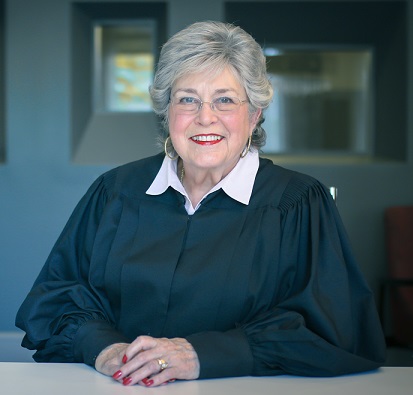 It’s no surprise Judge Bonnie Hellums devoted the second half of her career to working with those trapped in the grips of drugs and alcohol. She was raised by alcoholic parents and her first husband had an addiction to alcohol and gambling.
It’s no surprise Judge Bonnie Hellums devoted the second half of her career to working with those trapped in the grips of drugs and alcohol. She was raised by alcoholic parents and her first husband had an addiction to alcohol and gambling.
“I was tough as a judge because of that, but that’s what helped pull some of them around the corner,” Hellums says.
Passion for our Board
Hellums became involved with the Houston Recovery Center board through former Mayor Annise Parker, who appointed her because of Hellums’ interest in recovery issues.
“A lot of people running the city and county were students of mine back when they were in college – Ed Emmett, Annise Parker, Jack Cagle,” Hellums says.
Her passion for serving on the board relates to how Houston Recovery Center looks at substance use in a different way. She said Leonard Kincaid is innovative and comes up with good ideas on how to handle harmful and hazardous substance use in our community. Hellums is especially pleased with the recognition the sobering center has earned from around the country and state for what it’s doing.
“It’s wonderful to provide a respite, a place where we can start trying to get these folks into some sort of recovery and give them another chance,” she states.
Impact as a Judge
Hellums’ background is diverse and deep, which makes her a logical choice for her current service on 13 boards. She started working in higher education, went to law school at night while she worked at Rice University, and practiced law for 10 years. She later served as judge for 20 years in the 247th Family District Court in Harris County, where she handled 9,000 cases a year.
Hellums is most noted for starting a Family Drug Court in 2004 and later Infants and Toddler Court for Harris County, the first and only ones in the area. The court hears cases involving CPS and allegations of child abuse or neglect due to substance use disorder. Using a phased approach to recovery, the court works with CPS to reunite families, when possible, after treatment is complete.
“People said I was crazy to take 10 percent of my work week (Tuesday afternoons) to do drug court instead of listening to my cases,” Hellums says. “But I believe this has a better chance of helping people.”
Hellums added the infant and toddler component in 2009. She realized she needed to work with these kids earlier to truly make a difference.
“If you can do some remedial work with these kids before they get past the age of three, you can make a difference in how they develop and how their brain develops,” she relates. “We made a big difference in helping the children and trying to keep them with their parents.”
Hellums credits both the lawyers who gave of their time and the CPS workers who worked hard to start understanding addictions and what it was doing to people.
Impact of Substance Use Disorder
Hellums shared that alcohol and drugs related to 60 percent to 70 percent of the divorces coming through her court, as well as CPS cases.
“There were cases where I took the children away because parents with substance use disorder neglected their kids,” she relates.
Hellums said being a licensed chemical dependency specialist helped a lot because she understood what was going on.
Her message to other judges in Harris County: “Please start to understand addictions, alcohol and drugs, and the effect they have on the people in front of you.” Hellums says this is especially relevant for the family court judges and juvenile judges. Hellums said the impact of these courts has been phenomenal.
“Retirement”
“I’m busier than a cat trying to cover poop on a tin roof,” Hellums quips. “I’m a retirement failure.”
Now that’s she’s retired and not living “undercover” as a judge, drug court graduates send her pictures and messages. One such message: “Judge, here is the kid you took away from me when I was high on meth. Now he’s graduating from high school with honors and has a college scholarship, plus two clean and sober parents.”
Today, Hellums serves as a visiting judge in eight counties, is deeply involved with 13 boards, and chairperson of the Department of Family Services Advisory Board for the State of Texas, a recent appointment by Governor Abbott. She’s also on the Judicial Commission for Mental Health for the State of Texas.